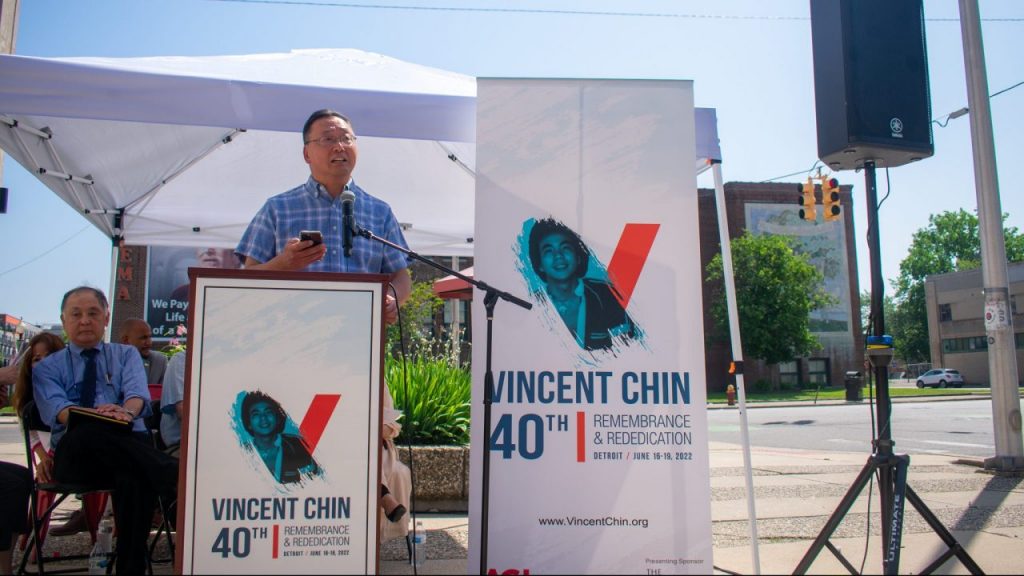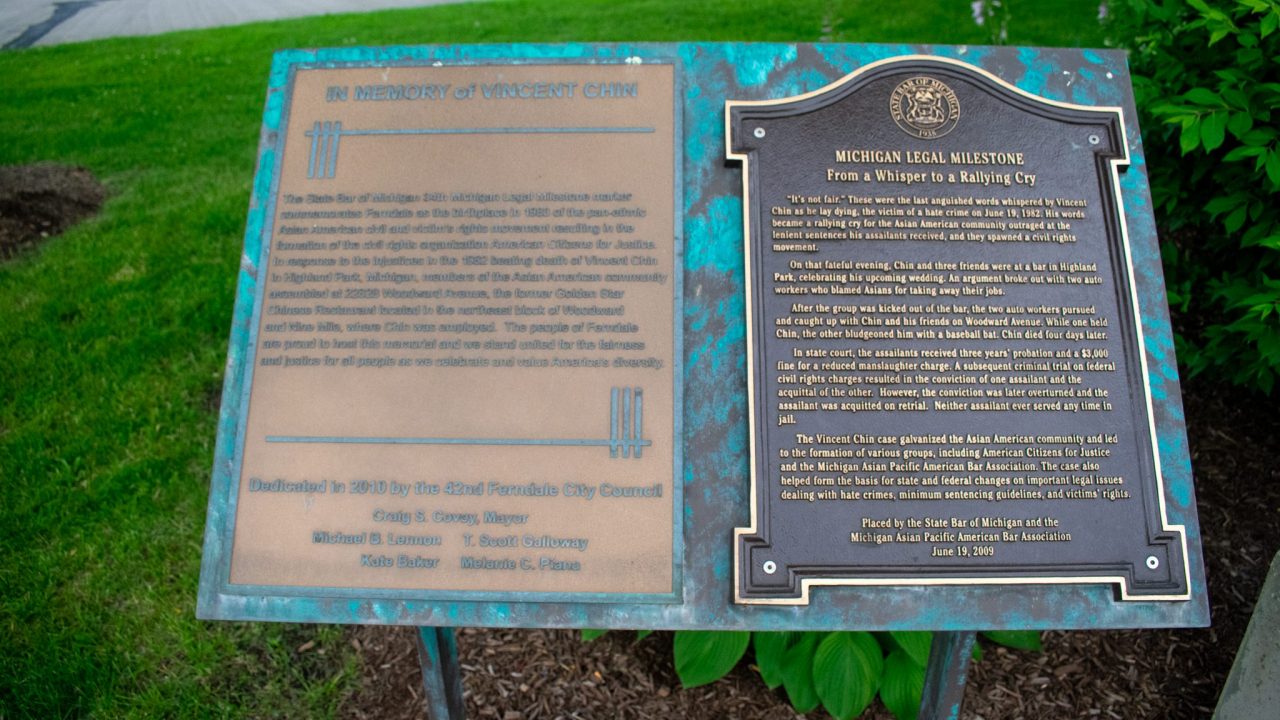For Asian Americans, 40th anniversary of Vincent Chin’s killing is a reminder of how much work still remains
Amid a rise in anti-Asian hate, what we do — and don’t do — has a lasting impact on not only us but future generations, says David Han of the Michigan Asian Pacific American Affairs Commission.

Comissioner of Michigan Asian Pacific American Affairs Commission David Han gives a speech at Vincent Chin 40th Remembrance & Rededication Official Kickoff, on Wednesday June 15, in Detroit.
Four decades ago a pair of white men beat Chinese American Vincent Chin to death in Highland Park, then received no jail time for the crime.
The incident became a crucial turning point in Asian Americans’ nationwide fight for civil rights.
In Michigan, state lawmakers created the Michigan Asian Pacific American Affairs Commission. The commission’s David Han says the 40th anniversary of Chin’s death marks a time to reflect on what happened and realize how much work still remains.
Listen: David Han on the challenges still facing Asian Americans decades after Vincent Chin was beaten to death.
WDET’s Quinn Klinefelter spoke with David Han about the impact of Vincent Chin’s death on Asian Americans’ fight for civil rights. Read the interview, edited for clarity, below:
David Han, Michigan Asian Pacific American Affairs Commission: Really it’s about a rededication and a reminder that underneath the surface things are not OK. For those of us now, if things are not OK, [it will be the same] automatically for our next generation and their next generations. And we have to stand up, speak up and stand with. With all of the challenges that we’re experiencing today in America, conflicts, racial hate and other kinds of hate, these things don’t go away by itself. We have to work on it together.
Quinn Klinefelter, WDET News: It does seem that it’s far from being OK. A group called the Center for the Study of Hate and Extremism found that hate crimes against Asians and Asian Americans are up 339% this year just compared to last year. New York City, San Francisco, Los Angeles and other cities are seeing more anti-Asian hate crimes now than when the pandemic started in 2020. And that was when former President Trump kept referring to COVID-19 as the “China virus.” Do you think these attacks are tied to remarks like those from Trump? And why do you think they would be increasing now?
Well, leadership matters. Words matter, actions matter. Apathy matters. And atmosphere matters in our day-to-day lives, whether we feel safe. In leadership roles of any kind, whether it’s the presidency or leaders in companies, leaders in our communities or even leaders in our churches, the positions and the narratives that different folks speak, based on self-interest as well as fear, certainly impacts the Asian community in America. Asians who are Americans. Being American doesn’t mean [just] one segment of the demographic. In the 1980s, Vincent Chin suffered the wrath because of anti-Japanese sentiments at that time, because the auto industry was struggling and folks in Detroit felt that they were losing their jobs because of the Japanese imports. And Vincent Chin, who is Chinese American, got killed with a baseball bat. When there is rhetoric, hate, unfounded fear and misplaced fear, painted with broad brushes and painted with the zero-sum game idea that someone else is gaining at their expense, unfortunately, some people act out on that. And [Chin] took the wrath of that. Similarly, during the pandemic, it was so easy to scapegoat and vilify China. And Americans of Asian heritage were targeted in the United States out of frustration, out of misguided narratives and whatnot. So absolutely, leadership and what we do and what we don’t do, and what we condone and what we are apathetic to, impacts people’s lives.

You mentioned the anger that some have said those who attacked Chin and killed him were feeling because they felt threatened by Japanese imports taking business and jobs away from Detroit autoworkers. When you look again at leadership, Trump used tariffs against China, ostensibly to help the U.S. auto industry. President Biden may lessen some of those but he also says China is the biggest competitor that the U.S. faces. When you look at all of that, do you think that Americans can view China in particular as a competitor without seeing Chinese people, or by extension maybe all Asians, as the enemy?
Yeah, very good question Quinn. Right now, Russia is the aggressor in Europe against Ukraine. So we are choosing to stand up against a menacing threat, which is Putin’s Russia. And they are white, racially white. And we don’t extrapolate to thinking that all white people are bad and therefore we’re going to ostracize them and we’re going to treat them differently, and we’re actually going to hurt them. We don’t do that. The China problem is very complex. China is an absolute, strong superpower. They are number two in the world economy. So definitely a competitor. And the economic and military experts have actually labeled China as the greatest threat to the status quo of the free world. And Asians are easy to spot in America because we look different than whites or African Americans. But just because of that we can’t be equating us with the threat of the Chinese government. It’s not OK to paint everything with one brush and perpetuate narratives for political gain. That’s criminal.
Vincent Chin’s killers got off with very light sentences. There have been concerns, obviously up to today, about how people of color in general are treated in the legal system. But even today, in New York City alone, the Asian American Bar Association of New York reports that only 3% of the attacks against Asians or Asian Americans resulted in a conviction. Do you think that makes people of Asian descent, in particular, less likely to even report such attacks?
First of all, to report this takes a lot of effort and courage and education and support. So the number of cases reported are just the tip of the iceberg. I would say it’s like 1/100th, even if that, of the number of abuses that are out there. It’s a huge challenge. And so it doesn’t work to put the burden on the Asian Americans to stand up for themselves. Because this is such a difficult thing for even the most skilled Asian American to confront these things on their own. I see the burden is on our society. It’s like a child being bullied in school, whether Asian or white or African American or Latino, it doesn’t matter. The child being bullied is vulnerable and the bullies pick on them because they can get away with it. Without punishment, often. There’s a tremendous imbalance of power. So in order to help that child who’s being bullied, we can educate that child in terms of what he can do. But we (also) have to educate everyone in school. We have to educate the teachers and we have to educate the parents that not only is it not OK, but when someone is bullied we come alongside them and we help them and we defend them and protect them against evil.
Photos by Nate Pappas
Correction: 5 p.m. June 18, 2022: This story has been updated to clarify David Han’s role with the Michigan Asian Pacific American Affairs Commission.
Trusted, accurate, up-to-date.
WDET strives to make our journalism accessible to everyone. As a public media institution, we maintain our journalistic integrity through independent support from readers like you. If you value WDET as your source of news, music and conversation, please make a gift today.
